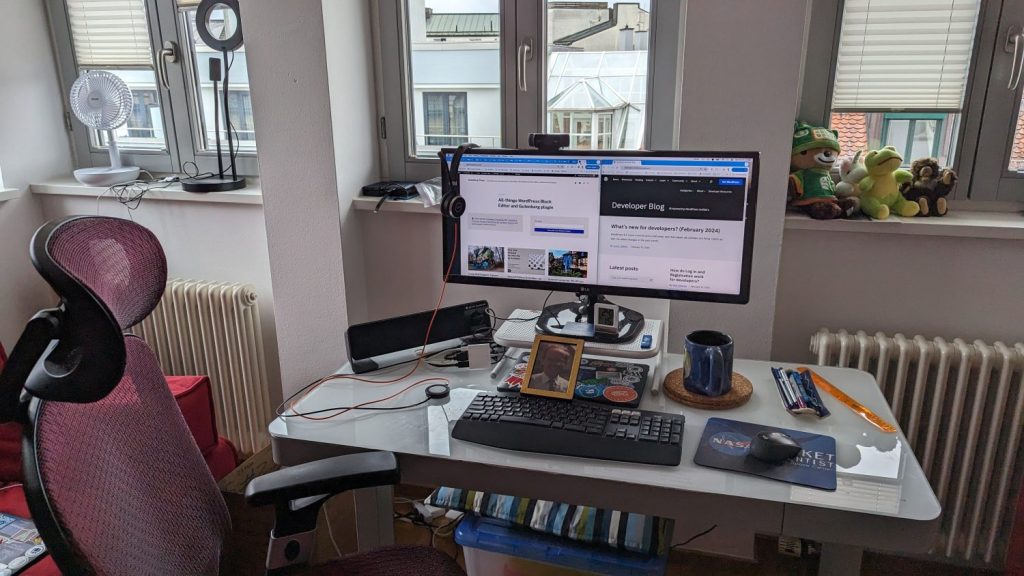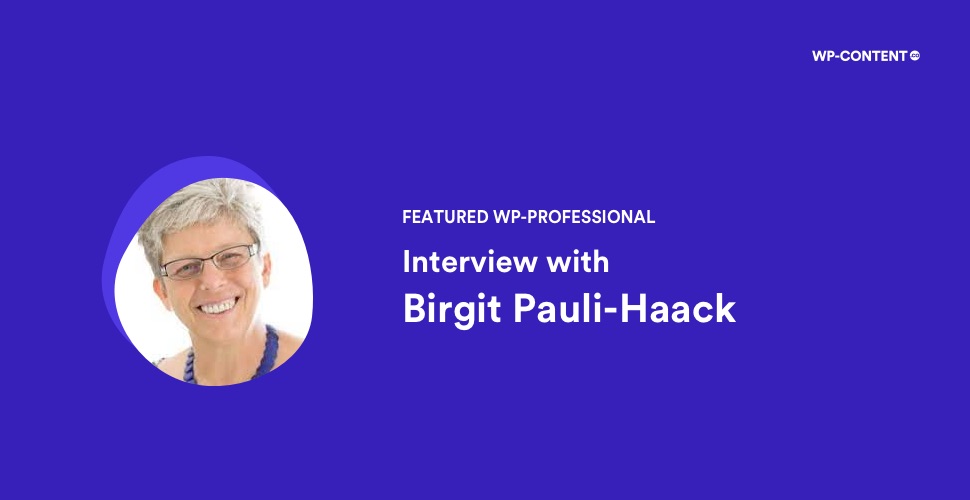Meet our WP-Professional of the Month, Birgit Pauli-Haack – an Automattic-sponsored WordPress Developer Advocate and a driving force in the WordPress community. Her passion lies in fostering community spirit through knowledge sharing.

She leads Gutenberg Times, a platform that curates news, opinions, and insights about the revolutionary WordPress Block Editor. Beyond Gutenberg Times, Birgit was the founder of Pauli Systems, a 100% distributed company that leverages WordPress to build nonprofit sites and applications, she ran for almost 20 years.
She also contributed as a deputy of the WordPress Global Community team and organized WordPress Meetups and WordCamps. In her current role, she continues publishing Gutenberg Times and contributes full time to the WordPress core team. She has been a member of the release squads for the last five major WordPress releases.
You can connect with her on X.
You are well-known in WordPress circles today. How did the journey start? How did you start to�??code for a purpose�?�?
My WordPress journey started as a research project for a nonprofit internet service provider that was looking for a CMS to offer other local nonprofits to host on their servers. We tested about 30 CMSs before; WordPress won hands-down due to the open-source nature, that vast amount of online documentation and tutorials and the flexibility for extending it with plugins and themes. Most of my work building websites has been connected to nonprofit organizations, and there was always a certain purpose in any project I took on while running an agency for many years.
Where are you based? Does your location influence your work?

I lived for a long time in the United States and that’s where I worked and most of the clients were located. After I started working with Automattic, it wasn’t relevant where I was located. That was a prerequisite for our decision to move back to Germany, specifically Munich, to be closer to family and friends. My husband and I are now working from home and caring for our parents.
Please share some projects you are currently involved with, especially Gutenberg Times
The work with the Gutenberg Times has two parts: one is the weekly newsletter, with curated links to the WordPress team blogs and community contributions. It centers around the block editor and its progress into a site builder. We just published our 284th Weekend Edition last week. The second part is the podcast Gutenberg Changelog, which is recorded every other week and covers a new Gutenberg plugin release, features that are still under development, and other topics around the site editor. We are about to record episode #96 of the podcast, with Tammie Lister, one of the leads on Gutenberg Phase 1.
Two more WordPress projects, I am heavily involved in are the WordPress Developer Blog and the WordPress Outreach program. The former is to provide better and more timely information to WordPress developers who are not contributors, plugin developers, theme builders and agency and freelance developer building sites for others. The latter is a continuation of the FSE Outreach program, now that Phase 2 of Gutenberg development is complete.
What makes WordPress so special for you?
It changed how we built websites for customers, and I made some great friends in the community after I started contributing to various WordPress teams. I came for the software and stayed for the community.
What is your favorite a) Plugin b) Theme c) Hosting and why?
Plugin: Public Post Preview – the easiest way to collaborate on content without the reviewer/approver having to log in to the site. Once the draft is saved, you can obtain an expiring link to share with others, and they can read the post before you publish it. It’s one of the first plugins I started using in 2010, and have been installing it on every site ever since. Shout-out to the plugin developer, Dominik Schilling, for keeping it updated and working with the block editor. I was star-struck when I finally met him at WordCamp Germany.
Theme – Twenty-Twenty-Four just became my favorite theme as a base theme for projects. The 100+ contributors built something quite remarkable, showcasing all the strengths of a block theme and the versatility for any kind of website.
Hosting – Pressable. For the last five years in our agency, we migrated all sites to Pressable because of the phenomenal customer service, and the excellent interface to add collaborators to a site for designers and developers. The built-in Jetpack features have had their value proposition. It’s a great deal. Since then, Pressable added many additional features for system admins and developers, it’s also part of the Automattic infrastructure that is one of the most secure and fastest in the business.
How have you seen Gutenberg evolve since its inception, and what trends or developments do you anticipate in the future?
It has been a massive change for content creators, and even the demos I held at non-profit conferences created a massive buzz among the attendees. Now that you can edit part of the site as well, starting with the query loop block, which allows you to customize a list of posts to your liking without getting a developer involved, solves many recurring requests for changes for freelancers and developers.
Patterns and templates give designers the opportunity to provide their users choices for headers, footers, post list and more, and then allow for the color palette to be standardized. We have already seen some highly creative designs in block themes, and that will continue. I also see a great influx of larger companies to continue to opt into WordPress editor, once there are more options to curate the editor experience to the needs of a brand’s styles, design systems and the needs of editorial teams.
The collaboration phase (3) will bring many features to the core that have been solved with plugins before, but now on a standardized basis, so freedom becomes possible again, freedom to change themes. There will be an interface built to manage custom post types and fields right into core.
Why do you think a considerable number of people still prefer Classic Editor over Gutenberg?
I am not so sure that usage equals true preference. For some, it’s actually a technical necessity. There are customizations in the sites from the last decades that might not be compatible with the block editor, the original developer is not available anymore to migrate to the block editor and the site owner, or company can’t make the investment. Some site owners use the block editor for posts, but rely on the classic editor for other content on the site. They keep it installed to use with a plugin that hasn’t been updated to work with the block editor.
With the distraction-free writing experience, writers, who like the white empty box to write without being interrupted by block toolbar outlines or settings features, can use it now with the block editor. The latest version of the Gutenberg plugin even has a toolbar that appears and disappears from the top on hover.
What are your thoughts on WordPress meetup and WordCamp, and how was your experience organizing them?
Only in 2014, I started attending WordCamps. 2018 was the first year of presenting at WordCamps and being part of the organizing team of WordCamp US. It’s always a great joy for me to meet my friends I have known for many, many years now to share a meal, walk in the park or just chat in the Hallway. I am thrilled to see all the meetups coming online again and the number of WordCamp to increase around the World.
I thoroughly enjoyed being a WordPress meetup organizer for 6 years. I met other WordPressers and each month we had different kinds of meetings, some for content creators, some for developers and some for freelancers and small agencies. Not all meetups had presenters, sometimes we just went around the room and asked people what tool and plugins they use every day, or discussed business day-to-day operations. I was also lucky to have three co-organizers who all had their special way of running meetings. We had a help desk during lunchtime in a coffee shop, a workshop style at a library and a get-together at a co-working space.
Organizing a WordCamp is not for the faint of heart. It takes dedication, perseverance, and calm in the face of the unforeseen. It really takes some major teamwork to get it done. If not all team members pull through, the work for the lead organizers gets overwhelming quickly. Once the day of the WordCamp arrives, the hard work is done and one gets to enjoy the hosting and the conversations, the exchanges with the sponsors etc. It is a highly gratifying work, it’s rewarding because it’s not easy and the after effects last the whole year, bringing new people to WordPress, helping people to contribute and have a better presence online.
What do you think about women�??s participation in the WordPress ecosystem? Can the community do anything to encourage more female contributions in all areas?
It takes extra effort to include more women on all levels of the WordPress ecosystem. “The Community” isn’t really a thing, unfortunately. The community is you. What can you do? When you are putting a list of speakers together, you might need to ask quite a few women personally to succeed in a diversified roster. It’s not always a lack of courage that keeps women from participating in the community.
One of the problems is that work and WordPress are not the only requests on a woman’s time. They also need to juggle their families’ household, child care and elder care. That’s a more societal barrier they have to overcome. The amount of spare time to research for an article or for a talk at a conference is mostly not there. Many don’t have the headspace with all the other organizational things in their lives, so you would have to lower the barriers and show persistence, as they won’t jump at the opportunity easily, knowing how much additional time is needed. Some barriers are finances, and various diversity funds can help with that.
What advice do you have for individuals looking to actively contribute to WordPress?
- Get a WordPress.org account
- Get a Slack account
- Get a GitHub account
- Connect your GitHub account with the WordPress.org account.
Note: Although GitHub primarily serves as version control for Core and Gutenberg, other teams also use GitHub as a project management tool to organize their work and collaborate on projects.
There are 21 contributor teams, that all work slightly differently depending on their purpose and the processes in place. Select one that appeals to you, and observe and listen to their channel and their meetings. The organization-wide meeting calendar helps you find meetings that are happening in your timezone window. Most teams also post on their respective team blogs the summary of meetings if you want to participate asynchronously.
Prepare for a lot of reading material, starting with the Contributor Handbook and then the Handbook of the team of choice. Some teams also have an onboarding/buddy system, to help new contributors to come on board.
If you are unsure which team you should select, contributors created an assessment tool, you can take to match your interests and skills to various teams.
If a WordCamp with a Contributor Day is happening near you, I hope you get a chance to participate there, as a face-to-face interaction with fellow contributors is a great way to get started and keep going.
Life has both success and failure. Please share one mistake that you made early in your career.
When I was younger, in my first leadership position, I was quick to judge and change things without inquiring about the history of why things were done that way in the first place. Later, I learned it’s called the concept of Chesterton’s Fence.
What is Birgit like away from WordPress? What are your ways of chilling?
During the week, I chill for a couple of hours in front of the TV binge-watching something on the streaming service, mostly British murder mysteries, American action movies or German Netflix series.
On the weekend, we meet friends, visit an exhibition or travel to see family. Once in a while, we hope on a plane to get away for a long weekend and visit places we want to see, like Venice in May or Torino around WordCamp Europe. We now live in an area in Europe where you can get into the Alps within an hour’s drive, so once the weather gets warmer we certainly will get up into the mountains and nature. For now, we enjoy the big public garden in Munich and the trails along the river in the city.
The WP-Content team wishes Birgit all the very best in her future endeavors and hopes to see her make more contributions to WordPress.
Meet our previous WP-Professionals of the Month – Hari Shanker, Winstina Hughes, Vikas Singhal, JB Audras, Ben Townsend, Michelle Frechette




